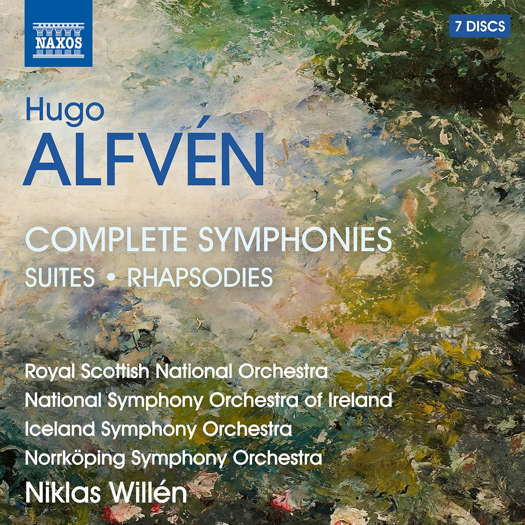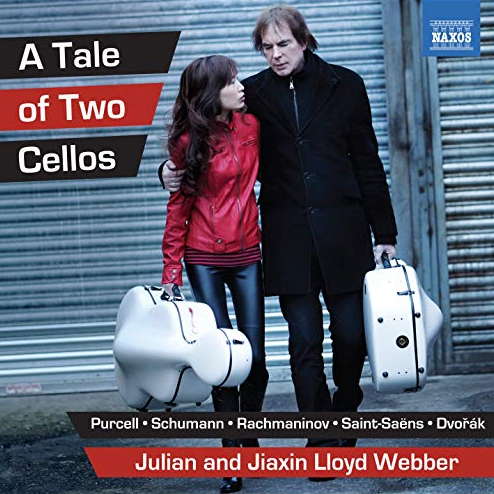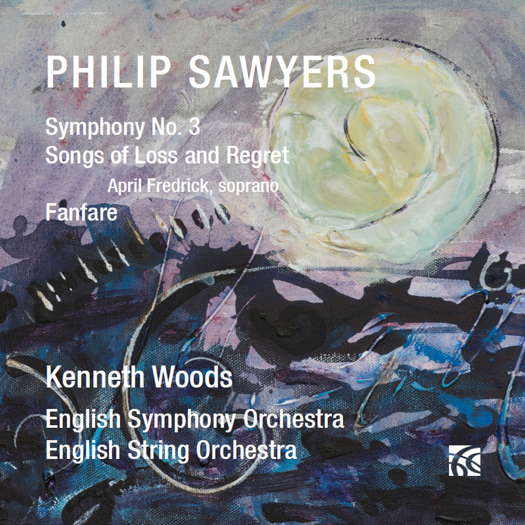- Gervase de Peyer
- Igor Kipnis
- Salzburg Festival
- Chilean
- Sir Malcolm Arnold
- Paradise Lost
- Igor Yuzefovich
- BBC series Civilisation

Very Humanistic
GEOFF PEARCE enjoys a Naxos set of orchestral music by Swedish composer Hugo Alfvén
'This is a set to be savoured.'
I was delighted to receive this set to review. Hugo Alfvén has long been a favourite composer of mine and I have long wondered why he does not appear on concert programmes and recordings much more regularly than he does. What appeals to me is his geniality, wit, and that I find his music very humanistic. He is also a very accomplished orchestrator, and is at home with large scale works as well as smaller ones. He had a rich and varied long life (1 May 1872 - 8 May 1960), was a violinist, conductor, composer and also a more than competent painter. I would love to see his works performed and recorded more often, and also those of many other fine Scandinavian composers.
I guess one of the reasons why Alfvén and also many of his contemporaries from Scandinavia are so often overlooked is that their style is often more late Romantic and considered old fashioned. To me, this does not detract from their worth at all.
This Naxos set contains the five symphonies, three rhapsodies, and the suites and short orchestral works. The final disc includes music of some of Alfvén's contemporaries from Sweden and this helps illustrate the influence that this fine composer had on those around him and also what in turn influenced him.
The first disc contains the Festival Overture Op 25, The Suite from Bernakungen ('The Mountain King'), the second Swedish Rhapsody 'Uppsala' and the four movement Symphony No 1 in F minor. This is all performed by the Royal Scottish National Orchestra, and is conducted by Niklas Willén who is the main conductor on this set. Many people regard Bernakungen, a ballet, as Alfvén's finest work, and although it was soon dropped from the repertoire, this suite is what is mostly performed today. It was composed between 1917-22, and was compiled by composer himself. The First Symphony was originally composed in 1897, but he revised it in 1904-5 and again in 1948.
Listen — Alfvén: Andante (Symphony No 1 in F minor, Op 7)
(8.507015 CD1 track 8, 0:00-0:40) ℗ 1995-2007 Naxos Rights US, Inc :
The second disc contains a seven-movement suite from Alfvén's last major work, a ballet called The Prodigal Son (1957) and the Second Symphony, written just a couple of years after the First Symphony. The orchestra here is the National Symphony Orchestra of Ireland and also has Niklas Willén as the conductor. I find the ambience of this disc very satisfying and the performances really sparkle. The ballet is filled with character and the short movements are a real delight to the ear. The symphony is a fine work and it is easy to see how these first two symphonies would so profoundly affect Swedish music. The final fugal movement of the symphony is really uplifting.
Listen — Alfvén: Fuga: Allegro energico (Symphony No 2 in D, Op 11)
(8.507015 CD2 track 12, 0:34-1:12) ℗ 1995-2007 Naxos Rights US, Inc :
The third disc contains the Third Swedish Rhapsody, the Dalecarlian Rhapsody, Op 47 (1931), the tone poem A legend of the Skerries Op 20 (1904) and the Third Symphony, Op 23 (1905). The artists featured are the same as on the first disc. The rhapsody is reflective and quite varied in character, the tone poem is quite emotionally charged and the Third Symphony is a sunny, happy work and one that I had not heard before.
Listen — Alfvén: A legend of the Skerries
(8.507015 CD3 track 2, 4:59-5:43) ℗ 1995-2007 Naxos Rights US, Inc :
Disc 4 contains the Fourth Symphony (1918-19), Op 39, 'From the outermost Skerries' and the Festive Overture Op 52 (1944). The Fourth Symphony is Alfvén's work that I am most familiar with and is one I play frequently. It employs a large orchestra, a soprano and tenor soloist, solo violin, cello and cor anglais. The vocalists are Arndís Halla and Jóhann Valdimarsson, and their parts are vocalises. The orchestra here is the Iceland Symphony Orchestra, again conducted by Niklas Willén. It is an expansive, emotionally charged work, reflecting the state of two young people's souls that have a connection with the Skerries, a group of bays, shoals and islands that stretch outwards into the Baltic from Stockholm. The outer shoals can be quite changeable and sometimes stormy, as the music reflects. This is a lovely recording of this work, but sometimes the recorded sound is a bit hard edged on my equipment.
Listen — Alfvén: Allegro agitato (Symphony No 4 in C minor)
(8.507015 CD4 track 4, 0:02-0:47) ℗ 1995-2007 Naxos Rights US, Inc :
The Festive Overture is a happy, rousing piece of music. There are quieter sections but a lot of it is triumphant, and I think it was designed to appeal to the widest audience.
The fifth disc contains Alfvén's last symphony - No 5 in A minor, Op 54 (1942-52) and a movement entitled 'Andante Religioso' from the Revelation Cantata, Op 31. Both of these works are performed by the Norrköping Symphony Orchestra under Niklas Willén. I had not heard either work before. Evidently the composer worked on this symphony a few times during the decade in which it was written, and sometimes the first movement is performed alone. I like this symphony very much. I do not tend to analyse or consciously think of formal structure whilst I am listening, but tend to see if the work engages me or not. This symphony certainly does. I am also impressed with the rich acoustics of this disc, and the orchestra is a fine one.
Listen — Alfvén: Finale: Allegro con brio (Symphony No 5 in A minor, Op 54)
(8.507015 CD5 track 4, 9:53-10:41) ℗ 1995-2007 Naxos Rights US, Inc :
The sixth disc contains two suites that contain music from two films; Synnöve Solbakken Suite, Op 50 (1934) (arranged by E Hladisch for chamber orchestra, 1939) and En bygdesaga ('A Country Tale') Suite, Op 53 (1944). The orchestra and conductor are the same as on the previous disc. There is also a little piece, Élégie (vid Emil Sjögrens bår), Op 38 ('Elegy, at Emil Sjögren's Funeral') (1918), which has some of the most grief stricken music I have ever heard. I am especially fond of the second suite on the disc, 'A Country Tale'. The music is colourful, and at times makes my heart race. (Not a mean feat with an old fellow like me.) Like discs 2 and 5 particularly, the acoustics of the recorded quality strike a sweet spot with me.
Listen — Alfvén: Baying of Wolves (A Country Tale)
(8.507015 CD6 track 12, 2:28-3:18) ℗ 1995-2007 Naxos Rights US, Inc :
The final disc is interesting in that it has pieces by a few earlier composers, who Alfvén would have heard or been influenced by, and some of his contemporaries from following genenerations that he would have influenced. Some of these composers like Lars Erik Larsson, Dag Wirén and Wilhelm Stenhammer are well known - others perhaps less so. There are also a few final works by Alfvén including a piece I did not care for as a boy, yet it is probably the piece by which Alfvén is most known, the first Swedish Rhapsody, 'Midsummer Vigil', Op 19. Hearing it again, I have become very fond of it. The Helsingborg Orchestra is here directed by Okko Kamu.
Listen — Alfvén: Midsummer Vigil Op 19
(8.507015 CD7 track 14, 10:47-11:41) ℗ 1995-2007 Naxos Rights US, Inc :
This is a set to be savoured. In my opinion, we do not hear enough of so many fine Scandinavians, and in particular, Hugo Alfvén. I have played some recordings to musicians I know and they all asked the same question: Why is this music not more often programmed? All the forces here are very fine, the recording quality overall is great, and I think listeners will get as much enjoyment from this set as I have.
Copyright © 30 December 2022
Geoff Pearce,
Sydney, Australia

CD INFORMATION - ALFVÉN: COMPLETE SYMPHONIES, SUITES, RHAPSODIES




